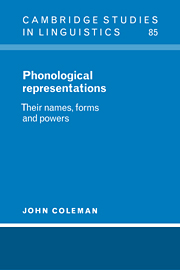Book contents
- Frontmatter
- Contents
- List of figures
- List of tables
- Preface and acknowledgements
- Key to symbols
- 1 Introduction
- 2 Segmental representations and their phonetic interpretation
- 3 Segmental and transformational phonology
- 4 Non-linear phonological representations in contemporary generative phonology
- 5 Phonological representations in Declarative Phonology
- 6 A declarative analysis of Japanese words
- 7 A declarative analysis of English words
- References
- Index
Preface and acknowledgements
Published online by Cambridge University Press: 14 August 2009
- Frontmatter
- Contents
- List of figures
- List of tables
- Preface and acknowledgements
- Key to symbols
- 1 Introduction
- 2 Segmental representations and their phonetic interpretation
- 3 Segmental and transformational phonology
- 4 Non-linear phonological representations in contemporary generative phonology
- 5 Phonological representations in Declarative Phonology
- 6 A declarative analysis of Japanese words
- 7 A declarative analysis of English words
- References
- Index
Summary
I shall begin in antiquated style, if I may, with an apology to the reader for burdening them and the academic libraries of the world with another pound of paper and probably many thousand more words of text than the world really needs. The thesis on which this monograph is based was too long: I have tried to be more judicious in revising it. In order to explain my purpose, it is perhaps easiest to start with a little personal history.
In the first half of the 1980s, as I began graduate study, the Chomskyan linguistic mainstream was shaken by a revisionist, non-transformational approach, Generalised Phrase-Structure Grammar (GPSG). It was not the first plausible challenger to transformational grammar, but for many it was the most credible. One part of GPSG's approach was the articulation of a detailed theory of linguistic representations employing features and structures of features. How attractive, then, was the prospect of extending the approach to phonology! I was not the only graduate student who saw the research opportunity in that ambition: at the University of Edinburgh at that time, Ewan Klein and a number of his students, Jo Calder, Jim Scobbie, Steven Bird and Michael Broe, were working with a similar aim in mind. We met at times during our graduate years, and though we did not exactly work collaboratively, the exchange of ideas, papers and eventually theses led to the approach now called Declarative Phonology (Scobbie, Coleman and Bird 1996).
- Type
- Chapter
- Information
- Phonological RepresentationsTheir Names, Forms and Powers, pp. xv - xviPublisher: Cambridge University PressPrint publication year: 1998



